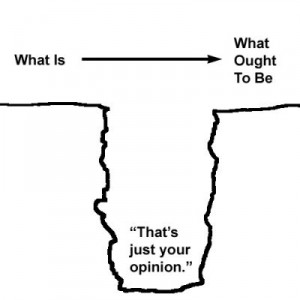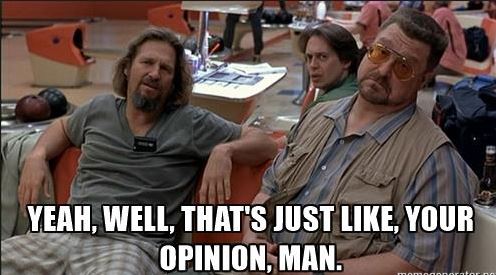 8. Is/Ought “Resolved”
8. Is/Ought “Resolved”
Is/ought is, arguably, the fundamental conundrum of philosophy. It is certainly one of the topics Sam Harris and his detractors struggle with, and that Harris has been accused of not adequately addressing. His ethical system’s incoherence (addressed above) is a good segue into the is/ought topic. But before we tackle it, let’s note that the is/ought conundrum is related to two other topics:
1. The naturalistic fallacy, which causes no end of confusion in human affairs; from irritation with enlightenment “natural law” prescriptions, to irritation with what the pop cultural value of “natural medicine” or “natural food” is. The naturalistic fallacy is related to the is/ought conundrum because just by saying that something is naturally the case, does not mean that it ought to be considered a good thing.
2. The argument from the existence of evil, which is used against theism by atheists, and which a consistent atheist would likely seek to levy against pantheism. Simply put, the argument from the existence of evil is: If God is all powerful and all good, therefore evil could not exist. But evil does exist, therefore an all powerful and all good God does not exist.
The argument from the existence of evil’s connection to the is/ought conundrum is a bit more obscure, but its connection is particularly relevant to the pantheist:
If, (a) what ought to be is the good, and if (b) according to a pantheist nature (what is) is the good, to the degree that it is god, therefore (c) nature is what ought to be. But, then how do we account for evil? How do we account for childhood cancer, or earthquakes, or murderous sociopaths?
So then:
What is the scientific pantheist’s position on is/ought? How should we get from our knowledge of what is to deciding what ought to be? And if pantheism can satisfactorily resolve is/ought, does that also help us avoid the naturalistic fallacy and resolve the argument from evil?
First let’s agree with Harris that however we cross the is/ought divide, it’s unavoidable (even if there isn’t some sort of deductively arguable logical jump). The fact remains that to exist, and particularly to function in this reality, to “creatively avoid the dissolution of the metabolic process that moves through us”, we somewhat paradoxically have to move from is to ought. Actually, it’s pretty much impossible to think of any action or ethical choice that isn’t somehow defended with an argument from what is the case. And that ironically even applies to the argument that one can’t get from is to ought: i.e. “It is the case” (presumed statement of fact) that “you can’t” (normative prescription) get from is to ought. Likewise, those who use the is/ought conundrum to eschew attempts at a coherent meta-ethical theory are still bound by the unavoidable connection of is to ought. For example, a common tactic for resolution is, we “can’t get from is to ought” (presumed statement of fact), therefore “I as an individual must create my own Meaningful good life” (normative prescription). So, since it is still the case that descriptive statements are obviously different than prescriptive statements, then how do we best resolve this conundrum?
Scientific pantheism’s answer lies in the understanding that, since we have to move from is to ought anyway, then it pragmatically is the case that we are best served by assuming/accepting (or more importantly having faith in) the belief that valuing what is most generally descriptively true (the universe as a whole and the universal laws of physics), is what ought to be. What is most generally true should thus be at the top (the highest value) of what then becomes the most coherent/unified (since the whole universe is included), and thus most functional, resulting ethical hierarchy (the key word here is generally). To the degree that we are not nihilistic or suicidal we all do this anyway, when we assume, and thus choose to live as if, our existence in this reality is worth it. I.e. reality is good, or, i.e. reality is the good, and thus worthy to be in. It’s the specifics that get you. Only a minority subset of specific things or actions within reality are, or can be, evil. In general, to exist and flourish through life’s occasional tribulations, we must believe or have faith that existence (reality (or the pantheistic god)) is generally good, or even wonderful and thus even worthy, in general, of worship. Subjectively, to function we must have faith that goodness is a kind of primary quality in general in reality, and that evil is a secondary quality that only applies to a certain minority of specifics. Note that this argument also explains (to pantheists) why parochially anthropocentric humans have felt compelled to invent the theistic god who is to be worshiped as benevolent and universal, even though evil events obviously still happen. This resolves the argument from evil: tidal waves and plagues may kill millions, supernova radiation bursts may take out planets, but to function, and not just give up and die, we must have faith that reality as a whole is still good/worth it. This idea of resolving the is/ought question with a general versus specific component isn’t such an unusual idea; virtually all of the things or actions that we subjectively choose to call good or bad are not wholly so. You may love your spouse, family, job, country, or home in general, but there are still probably specifics about all of these parts of your life that you don’t like, or even hate.
So, as a corollary ethical position, the naturalistic fallacy really only occurs when one attempts to move in a specific instance from is to ought in a way that is out of hierarchical accord with what is more generally the case. For example, if you as a life form choose to eat something specific that is altogether natural, but that will still kill you, then you are also choosing to go against acting in accord with what is the more general definition of life (a dissipative structure organized around the ability to avoid its dissolution).
But have we actually resolved the is/ought conundrum? Well, if, as explained above, we can’t help but somehow resolve it by any action or non-action we “choose”, then the only real choice isn’t if we resolve it, but how. And the scientific pantheists ethos of saying that what ultimately is, is what ought to be, is the most holistic, and thus most coherent and unifying, and thus has the most reasonable hierarchical value system (see the mandala particularly the top of the mandala, in the first essay above).
So some may be wondering, considering the points above, how is one to resolve G.E. Moore’s analytical “open question argument” that “proves” how the is/ought problem is intractable?
Let’s review Moore’s argument:
Premise 1: If X is (analytically equivalent to) good, then the question “Is it true that X is good?” is meaningless.
Premise 2: The question “Is it true that X is good?” is not meaningless (i.e. it is an open question).
Conclusion: X is not (analytically equivalent to) good.
Simple: The points above are not arguing that X (the universe) is analytically/logically or objectively equivalent to good. Rather, as the left side of the pantheist mandala shows, it is assumed that on the path to wisdom, most humans can subjectively recognize that it is spiritually enriching and pragmatically useful to accept that reality as a whole (the universe) is not only good, but the greatest good in general. That is, once again, because of the following two main scientific pantheist points; they may be great points, but it’s true that you are not analytically compelled, rather you can simply subjectively choose to agree with them, or not:
1. Reality as a whole is big enough, and in general awesome, beautiful, comprehensible AND mysterious enough (and the ego is small, ephemeral, and isolated enough) that cultivating reverential oneness with reality as a whole is profoundly spiritually enriching and motivating. Indeed you can argue that it is the most profoundly spiritually enriching and motivating thing, simply because it includes everything that you could care about.
2. It is pragmatically useful to call reality as a whole THE Good because, since everything is included in reality as a whole (including an instructive hierarchy of the sciences), a holistic/unified coherent meta ethos can then be derived that is in accord with this reality, because by definition there is no reality outside of it with which there could be conflict.
i.e. Subjectively, what ought to be the case most generally, is what is objectively the case most generally.
Ok, so in the end, have we really and completely resolved the is/ought conundrum? Honestly? No. And it is important to be honest about this: like pretty much everything in this reality, resolving the is/ought conundrum is only a matter of degree. Sam Harris may claim that since no sane person wants a universe with maximum suffering, then it’s ok to say that it’s a fact that we subjectively want well being, and therefore according to Harris it’s OK to make the jump to founding a meta ethos on “maximizing of well-being of conscious creatures”. Alternatively the scientific pantheist claims that cultivating faith that the universe as a whole is in general good, and thus The good, will create the most coherent and unified meta ethical system. But these, and any other founding prescriptive appeals, are more rhetorical than “ultimately” reasonable. The individual trying to choose an ethical system will ultimately choose based simply on how much they happen to care subjectively and emotionally about, say: well-being and avoiding suffering first, or about functional coherence and unity first.
So, as a final rhetorical pitch: if you are impressed by the success of science’s ability to enhance well-being, then remember: modern scientific theories are empirically and functionally deemed most successful only if they can first present us with a more inductively coherent and unifying (reasonable) understanding of reality. i.e. Don’t put the cart before the horse!
Also, let us remember that deductive certainty is impossible in non-axiomatic systems, such as reality, leaving inductive reasoning as the primary route to (probabilistic) knowledge of such systems. And Harris’s boot-strapped moral system is unrealistically axiomatic.
And for fun, here is a lovely article: on Induction: (Distinguishing Generalizations from Universals).

